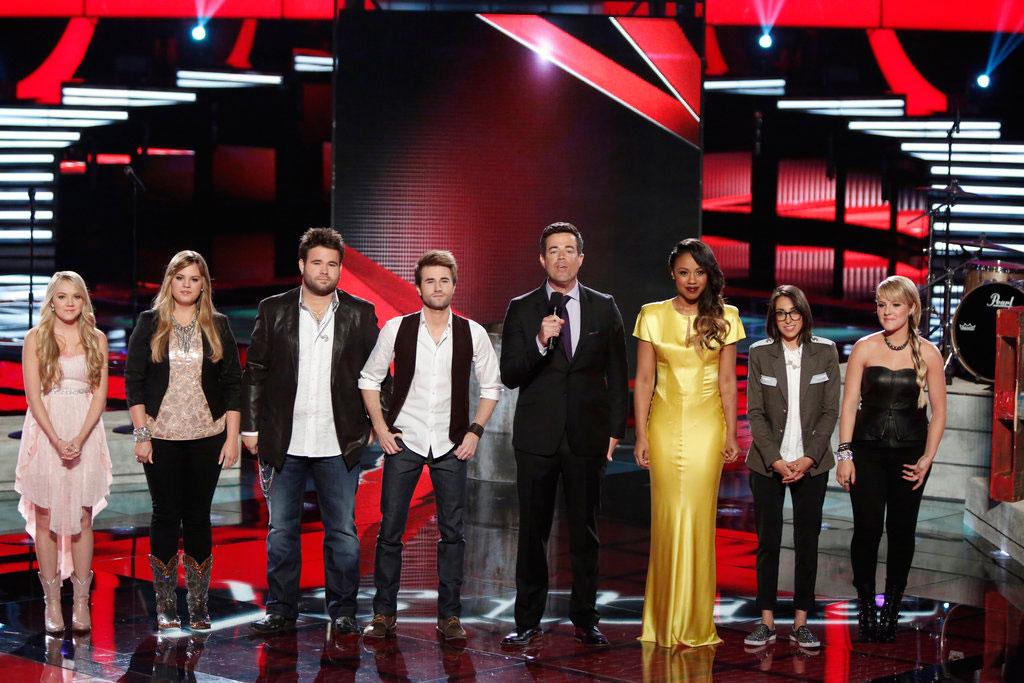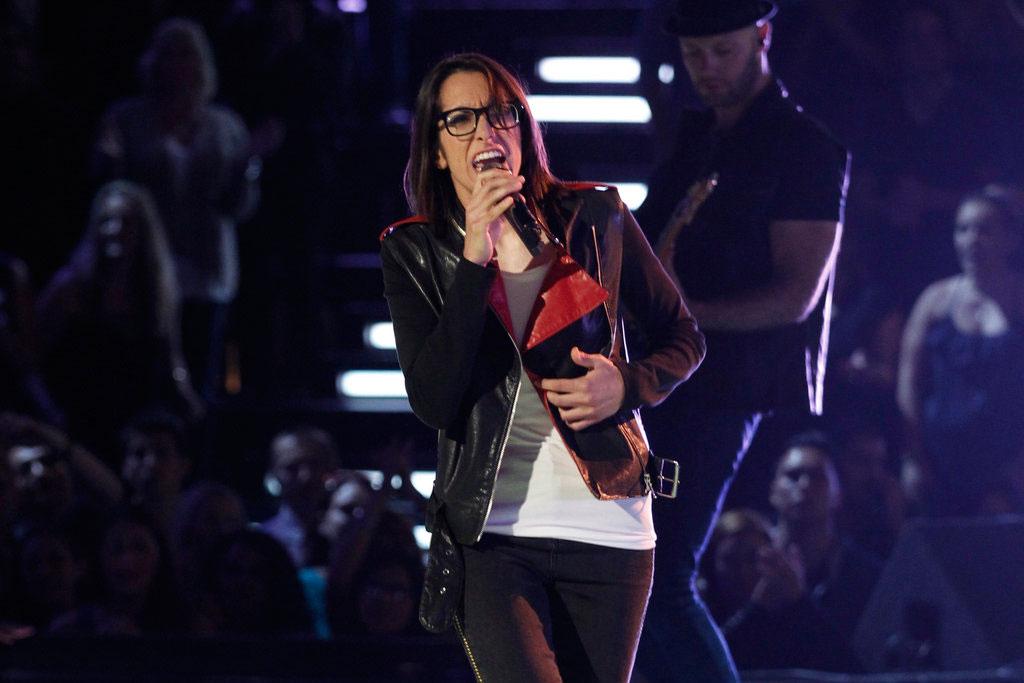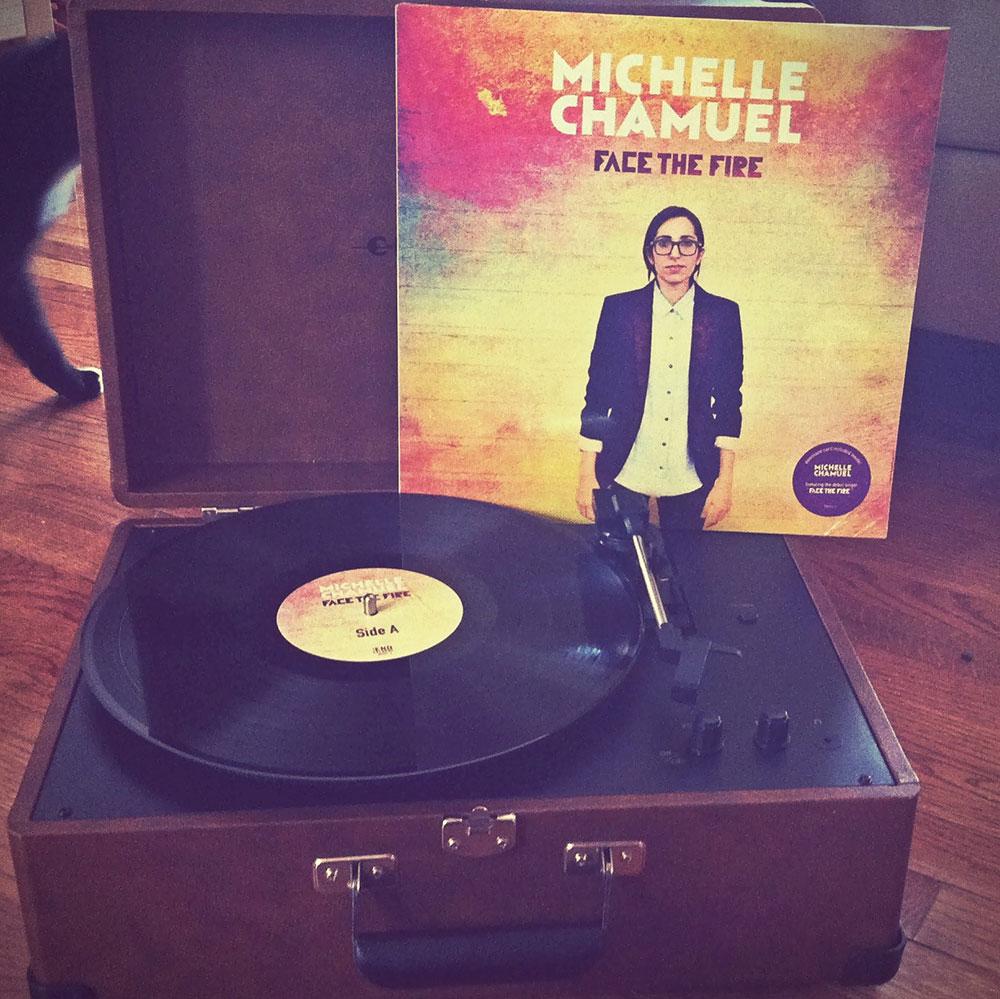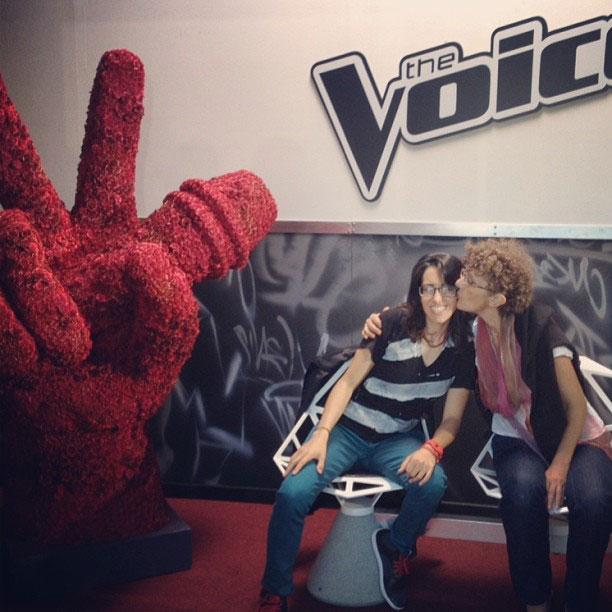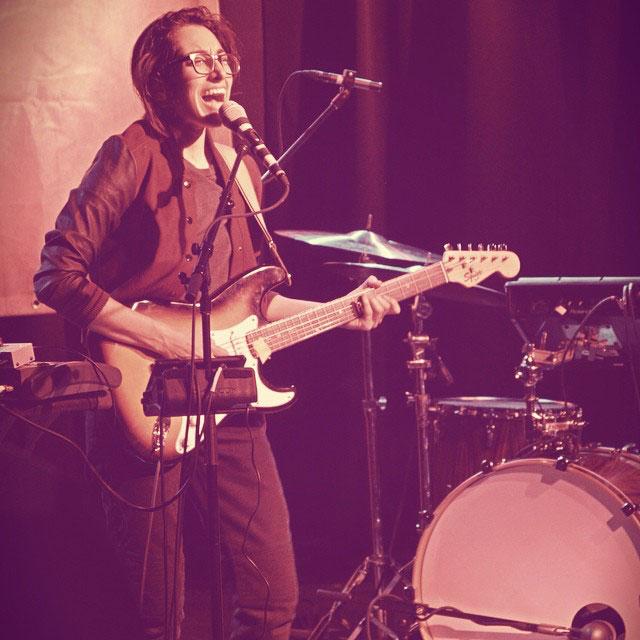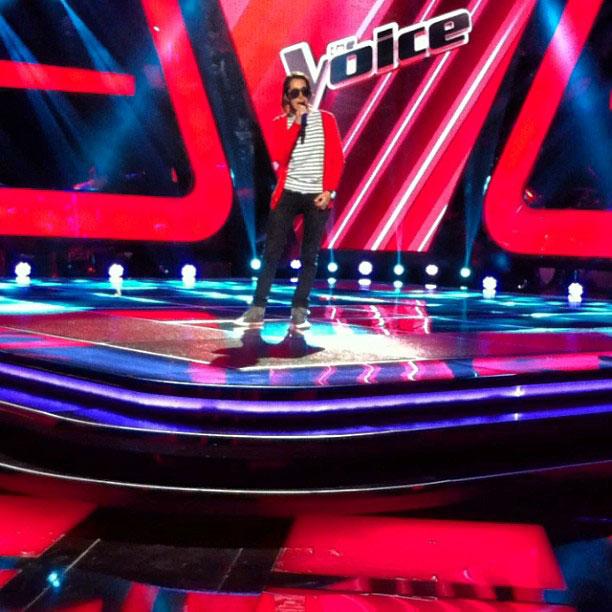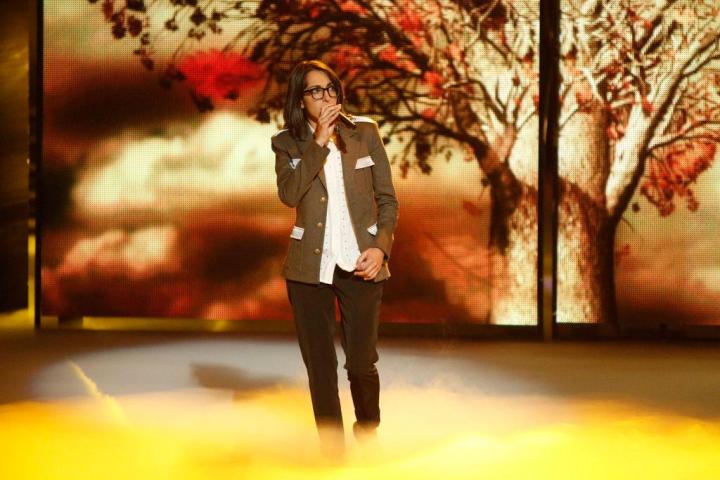
“It’s all about capturing vibe. I want to replicate the sound of emotion.”
Contestants on NBC’s hit vocal competition reality series The Voice usually find themselves at the crossroads of the two i’s — that is, at the intersection where being an interpreter meets becoming an individual. Michelle Chamuel, the bespectacled Team Usher vocal tornado who was the runner-up of Season 4 in early 2013, embodied the best traits of both i’s on the show, and has since emerged on the other side of the golden microphone to self-produce her first full-fledged solo album, Face the Fire (out today in various formats on The End Records). “I was able to stay true to my vision while collaborating extensively,” says Chamuel, who previous cut records with cult faves My Dear Disco and Ella Riot, and continues to do remixes under the name The Reverb Junkie. “I wanted to capture emotion in a way people could really hear. It’s a process of saying, ‘OK, I’m not perfect, but this is an authentic expression of myself, and I’m really proud of it.’ ”
Fire is a pure of-the-now record, fusing dancestyle pop with elements of rock, jazz, electronic, soul, and punk, from the melodic house of Weight of the World to the surface-noise poisoned valentine The Fall, to the reggae-infused scold of Money. “It’s such a process,” Chamuel admits. “Albums are like photos. They’re moments in time. They’re as perfect as that moment.”
“This title is going to sum up where I’m at.”
Digital Trends got on the line with Chamuel, 28, to discuss how The Voice prepared her for better teamwork in the studio, why $10,000 microphones aren’t necessarily worth it, and the state of EDM. This is one Reverb Junkie who knows how to dole out just the right kind of aural fix.
Digital Trends: You were quite hands on in terms of how Face the Fire had to be mixed and mastered for a number of different playback formats. Is high-resolution audio the best way to hear it?
Michelle Chamuel: Yeah. What’s really cool about the team I put together for this album is everybody is so careful and cautious and educated, so the album has been mastered for each platform it’s being released on. It’s a completely different mastering process for the vinyl, which will sound different than the iTunes version, the CD version, and the online versions. There’s a lot of care and intention put into it, and I’m sure the album will sound the way I hope it will sound for each medium. To the average person, it’ll probably sound the same if they just listen to it on laptops, but there’s nothing I can do about that. As long as they enjoy it.
That makes me think of Golden, which is a great track to experience on headphones since there’s so much depth in its sound design — the electronic opening, and the way your voice changes character and tone as the track unfolds. You don’t want listeners to miss out on all of that.
That’s how I felt about it when I made it! But hopefully it can be enjoyed no matter how anybody listens to it. We thought about it on every single level. I even made sure that we checked for mono compatibility, so that it won’t phase or sound weird.
And I really scrutinized it on headphones. I listened for every extraneous click or pop — those “that’s not supposed to be there!” moments — to make sure that the listening experience comes across as coming from something that was really lovingly made.
I love your attention to detail. Before we dive deeper into Face the Fire, can you tell me what production advice and assistance Usher and his crew gave you while you were recording your iTunes singles for The Voice?
When I wanted to sing Zedd’s Clarity, Usher’s team of professionals helped that vision come together really quickly and through a lot of work. Johnny Najera actually had me send an iPhone recording of me singing the verses while I was in Boston for the home-visit shoot for those 24 hours and he was still in L.A., which he used to make the delay track for both the live-stage version and the iTunes recording! [Voice band musical director] Paul Mirkovich was also giving us input on how to tackle the songs and the arrangements.
“You’re essentially having us perform the album every time you play it on vinyl.”
As far as advice during the recording process goes, that was mainly in Bill Appleberry’s court. He was the one recording us and mixing us. Bill was up around the clock to record the singers and the band for each track. He works so hard. When I couldn’t quite hit the high notes after a long day, he would tell me, “Raise your eyebrows when you sing those notes!” — and, magically, I would be able to hit them.
Another Voice secret revealed! How do you feel The Voice experience has helped you define yourself as a recording artist?
The Voice reminded me of how fun it is to live in other people’s songs, and that I can find myself in them. It allowed me to branch out in collaborative ways while still expressing my vision. This feeling extended in regards to making Face The Fire, where I was able to stay true to my vision while collaborating extensively. This is something I had forgotten about before going on The Voice.
Let’s delve into the collaboration between you, Tyler Duncan, and Theo Katzman for the production and sound design of Face the Fire.
In addition to being the executive producer, I was also the producer and engineer responsible for recording my own vocals. Tyler was the lead sound designer, and he designed most of the sounds you hear on the album. And Theo played most of the instruments you hear live — guitar, drums, bass. At the same time, it was all under the umbrella of, “Cool, this is the vibe I want, this is what I’m going for, and these are the tracks I want to reference.” Stuff like that. It was super-collaborative all the way through, and sometimes you’d hear something and have to go, “Oh man, I really love those crazy sounds in Weight of the World! Those cans!” That was Tyler’s idea right there, to include that rhythmic element.
Theo’s contributions are equally invaluable. His concept and mastery of groove, dynamics, and time-feel are some of the best I have ever heard. Like in Face the Fire — that’s his feel and his playing, pretty much as is. Unreal.
Above all, Theo is a phenomenal singer, songwriter, and producer in his own right. He brought his keen melodic and lyric sensibilities and sharp ear to every piece we worked on, making it all better. Many of the melodies and lyrics you hear on the album came directly from Theo. He helped me bring the verses of Golden to life, and he came up with the “If I can make you see” countermelody in the chorus that brought it all together.
Also, Devin Kerr mixed half the album and mastered every track with great love and skill. Face The Fire was a truly collaborative process, and would not be what it is without any of us who made it.
I read an interesting thing you said about your vocals: “I want to replicate the sound of emotion.” As a singer, that’s your main role. If we don’t believe you, that takes us right out of the song. So how do you go about doing that?
It’s such a process. Over the course of recording the actual vocals for this album and editing them together, I learned a lot. Some tracks have vocals that were recorded without any sound reinforcement, or some of them had harsher frequencies, and we had to cut them to the center. I personally like recording in spaces that don’t have harsh resonances. I didn’t really know that much about how to do that before, but it’s something I’ve been learning about — capturing it in a way that people can hear, where it’s not clipping all over the place.
“The Voice reminded me of how fun it is to live in other people’s songs, and that I can find myself in them.”
It’s crazy, because I’ve been in studios in the past for other albums where I’ve tried $10,000 microphones. I think one time, for the My Dear Disco album [2009’s Dancethink], they had me on the exact microphone Madonna used in Evita or something, but it sounded horrible on my voice! (chuckles) Like, I’m so sorry! I think it’s all about vibe. We ended up using a much less expensive microphone.
Is there a particular song where you feel all the right vibes came together?
Well, I kinda figured all that out for what came later in the album. Rock It is one of the vocals where we were able to leave more of the frequencies in there, because I had gotten the hang of getting more than the resonant frequencies out. To be totally fair, the studio is even more warm-sounding than ever, so we’re going to have to take advantage of that for the next project.
One thing that’s really cool for me that went right into the naming of Face the Fire is that it can be pretty daunting to go in there and engineer something, really taking 100 percent ownership of getting it to sound a certain way. It always felt nice passing it off to someone else, saying, “Hey, I’m not sure here; can you get it to the way I want it to sound?” But I really tried to face that fire literally and just say, “Hey, I’m going to learn through this process to become more of the producer that I want to be. This title is going to sum up where I’m at.” And it ended up being that way.
Albums are like photos. They’re moments in time. They’re as perfect as that moment. So you can always go, “Cool! I learned that from that moment.” It’s just a process of saying, “OK, I’m not perfect, but this is an authentic expression of myself, and I’m really proud of it.”
Learning how to be an individual artist; I can’t argue with that. That reminds me of how your vocals don’t get doubled until the end of Wake Up, where you sing, “So when you’re ready.” That was your choice to do it that way, right?
Yeah, yeah. That goes back to what we were talking about where I made all the vocal arrangements, what the harmonies were, what type of rooms they’re in, color, and stuff like that. I was sending over the vocals with instructions to Tyler and then Devin, and they would take it from where I left it as far as, “Cool — I want this size room, and here are my reverb and delays.” And it’s on a more refined level, because you open up those things into the mix.
In my own productions, when I just work alone as The Reverb Junkie, everything’s fixed on what’s going together because I’m so vocal-centric, and I can have the vocals overtake everything. So it was nice to hear what I sent over being ultrasculpted into the parts that were there to let the drums speak and the bass speak, and all that stuff.
Do you have any production role models, now that you’re sitting in that chair yourself?
Yeah, absolutely. And it’s funny, because the more I research it, I see how there are so many people involved in “getting” a sound. You can have a producer, a mix engineer, a mastering engineer — and the players, of course, and what they get out of the instruments. I’m not even sure where to point my fingers to, but definitely some people I brought up in the sessions that Theo and Tyler agreed with as references were Quincy Jones and his Michael Jackson production — the heart and the grooves in it are awesome! — and Imogen Heap, who is amazing. I just love her stuff. She’s one of the female role models I can point to and go, “Man, her production is inspiring, in addition to her songwriting and singing.”
“I’m just going to come out and say it: I miss cassette tapes.”
Let’s see, who else? Pharrell, his stuff is killer. Max Martin, Dr. Luke, Timbaland, Janelle Monae’s stuff — all super-cool. These are things that we looked to, to get certain sounds and achieve emotions in the same ways.
You mentioned vinyl briefly — is that a format you personally like? I’m glad to see we’re getting Face the Fire on vinyl.
Yeah, I love vinyl. And teaming up with The End, an indie label in Brooklyn — vinyl is a big investment, but they all believe in it, so we’ve made it a vinyl album too. I’ve always wanted to have a vinyl, and to take that care with it. I just think it sounds different. It’s cool. It’s like its own live performance. You’re essentially having us perform the album every time you play it on vinyl.
I like how you put that. Do you have a favorite vinyl record, or remember the first one you got as a kid?
Well, my parents had a lot of vinyl. They both moved out of my childhood home, and I remember there wasn’t a lot of care taken with the vinyl at that point. It was the late-’90s or 2000, and so vinyl wasn’t esteemed anymore. But I was like, “No no no!” because I knew it was important, even if I didn’t really know what vinyl was then. “Just please keep them!”
So I have a lot of their vinyl, and I’ve been adding to it ever since. We had the original Thriller — I’m not sure what pressing it was, but it wasn’t remastered or digitized. There was Donna Summer, The Supremes, a bunch of classical recordings, some Barbra Streisand, and some tango stuff; it all sounds great. I recently got this zither vinyl — some man from a long time ago playing this stringed instrument. It sounds so cool.
And I’m just going to come out and say it: I miss cassette tapes.
Oh yeah? What did you like about the cassette?
I liked the whole thing — I don’t know, they just kind of wiggled in a really cool way, making that sound. It just felt like more, well, gooey-sounding. I liked it.
Tape does have its own character, I agree, but I gotta stick with vinyl if we’re talking old-school physical playback. Well, to wrap it up, since you are the self-avowed Reverb Junkie, what’s your take on the current EDM scene?
I think it comes to whatever sounds you’re using. If someone is trying to be retro for retro’s sake and that’s authentically them, then hell yeah, that’s fine. But if it’s because they think it’ll make them cooler, that’s not going to help you be “hip.” You can make a stupid modern-sounding record that’s so cool. I think sometimes the most modern stuff combines modern and retro. I mean, I never heard anything like what Dario was doing, ever, until I heard [Tchami’s] Untrue (2014). That’s like super-retro meets something I’ve never heard before. Unreal.


